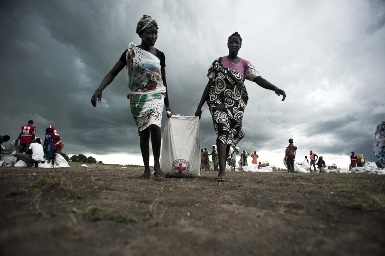S. Sudan rebels accuse government forces of shelling relief centres
September 29, 2014 (JUBA) – South Sudan’s opposition forces have accused the government of using long-range artillery to shell centres for internally displaced persons (IDPs) in Jonglei state’s Pigi county over the weekend.

According to Koang, “government troops under overall command of Sector Two commander Lt. Gen. Johnson Gony Beliu had shelled humanitarian relief centres, including the Kamel Relief Distribution Centre in Pigi county, on 27 and 28 September.
He said a “heavy barrage of artillery and mortar” had been fired by government troops stationed on Dolief Hills, the eastern bank of Sobat River, and had also distrupted aid distribution in the area.
“[This] deliberate and indiscriminate shelling also directly put at risk lives of humanitarian aid workers, noticeably those working for WFP ( the World Food Programme), UNICEF and Nile Hope at Kamel,” he said.
“It’s unfortunate that government troops decided to disrupt food distributions in order to subject IDPs to destitution and [a] state of despair,” Koang added.
At least 1.5 million people, mainly in Jonglei, Unity and Upper Nile states are classified as being at at high risk of food insecurity, according to the Integrated Food Security Phase Classification (IPC), a set of a set of standardised tools used to analyse the severity and magnitude of food insecurity.
Humanitarian agencies have previously complained of harassment and looting, while the UN says at least six aid workers have lost their lives since conflict erupted in mid-December last year after a political dispute within South Sudan’s ruling party (SPLM) turned violent.
Fighting between government and rebel forces has caused widespread damage to infrastructure and caused mass displacement among the civilian population. The crisis has led to warnings of a humanitarian catastrophe, with South Sudan narrowly avoiding plunging into famine this year.
The IPC last week eased its famine warning for the country after the number of people at risk of hunger dropped from 3.7 million in May to 1.5 million.
Despite improvements in the situation, the outlook for 2015 nevertheless remains grim, with 2.5 million people projected to be living in severe hunger from January to March based on current trends.
The UN World Food Programme (WFP) says this includes nearly half of the populations in Jonglei, Upper Nile and Unity states, which have been the scene of intense fighting since conflict broke out.
(ST)
